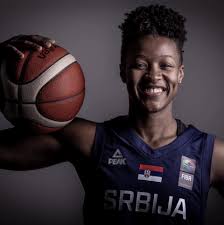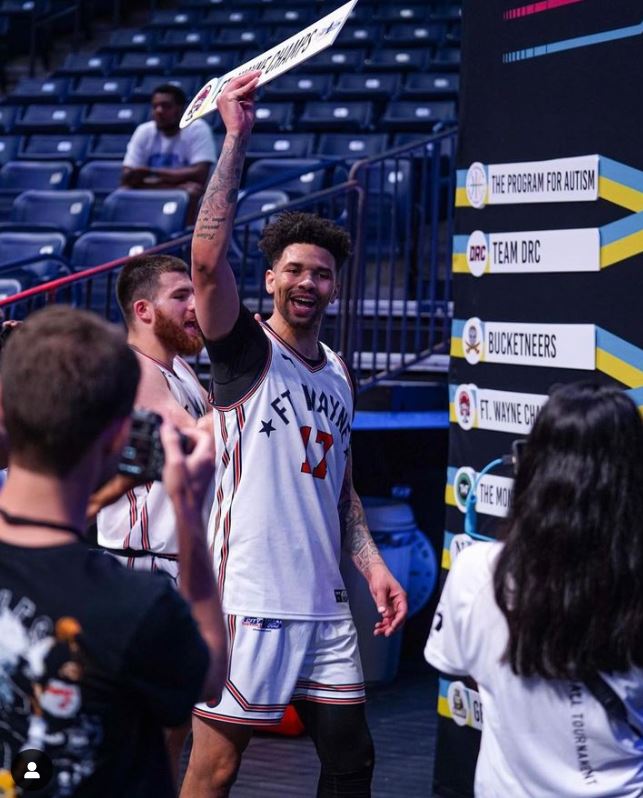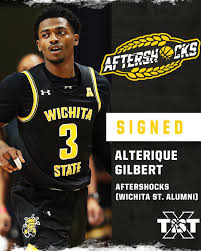The NBA Finals date back to 1947 (when they were known as the Basketball Association of America Finals) and the very 1st NCAA tourney was held in 1939. Olympic basketball competition is even older: it debuted as a demonstration event in 1904 and the men’s version became a medal sport in 1936, with the women finally getting their chance to go for the gold in 1976. The United States has dominated Olympic basketball competition from the start: the men have now won 17 gold medals in the 20 tournaments they have participated in during the past 88 years, while the women have won 10 gold medals in the 12 tournaments in which they have competed during the past 48 years. While we have to wait 4 years until the 2028 Olympics in Los Angeles, HoopsHD’s Jon Teitel will fill the void by interviewing as many prior Olympic players/coaches as possible. We continue our coverage by chatting with Steph Rovetti about facing Breanna Stewart in the 2014 Sweet 16 and winning a bronze medal a decade later…in a different sport!

You were born/raised in Reno, NV, where you were named state Runner of the Year in 2008 and Northern Nevada High School Player of the Year in 2010: how much of an advantage was your athleticism on the court, and what made you choose BYU for college? I was always fast as a 5’6” PG: on the court my speed had always been my advantage. I was a good attacker/slasher and had good court vision. The BYU coach back then was Jeff Judkins and I grew up in the church so I committed during my sophomore year. It aligned with everything I wanted from a college experience and I developed a good relationship with the 2 assistant coaches as well.
In the 2014 NCAA tourney you made it to the Sweet 16 before losing to eventual champion UConn: where does that undefeated Huskies team rank among the greatest that you have ever seen, and could you have ever imagined that a decade later you and your opponent Breanna Stewart (16 PTS/3 STL/4 BLK) would both be winning Olympic medals for team USA?! We were about to go into the Olympic opening ceremonies last month and I happened to see Breanna…but I do not think she remembered me during that 2-worlds-colliding moment. That was a tough UConn team. I grew up in Reno a little older than Gabby Williams (who went 148-3 as a player at UConn from 2014-2018 and won a bronze medal with France this month): Coach Geno Auriemma does a great job coaching his team. They had a threat at every position, but it was still a cool opportunity to play against them. That run to the Sweet 16 really prepared me to play sports at an elite level and helped me move on to this next level of sport: dealing with pressure, getting a lot of hype, etc.
After 4 years at BYU/1 year at Fresno State you switched to rugby and later earned MVP honors at the 2018 Club 7s National Championships: how were you able to make such a smooth transition to an entirely different sport? My sister Morgan and I overlapped at BYU for 1 year and she found rugby before me through her roommate. I had been around the sport by attending her games and being around the culture…but I still did not know the rules! I was coaching basketball at San Diego and my sister encouraged me to join the local club rugby team, which was very competitive because the national team trains here. I called her every day to ask questions, which really helped. It was an inclusive culture that was selfless about teaching the game to new people. It is a new sport in the US, so everyone was very patient and taught me how to work together: they were very welcoming. My club coach in 2018 is now my Olympic coach so the timing worked out very well for me: she would take me aside to teach me the fundamentals. Basketball is like rugby in a lot of ways: reading defenders, having good footwork, defensive positioning, etc., which helped the new sport come more easily to me. I played a lot of different sports growing up (including soccer) so I was able to learn new skills (like kicking the ball) and was a good all-around athlete.
Morgan also played rugby on the U20 Women’s National Team: who is the best athlete in the family? She will always tell you that she is stronger…but I am faster!
Your alma mater joined the Big 12 last year: any thoughts on conference realignment? It was great for BYU to join a power conference, which was long overdue. It is a winning program in many different sports and the amount of growth that I have seen is a testament to their administration/coaches/players. They can compete in a bigger conference on a bigger stage against the best teams in the nation, which is great to see.
You suffered a string of several injuries during the past couple of years: how bad were they, and what did it mean to you when you learned that that you would be going to the 2024 Olympics? My injuries were 1 of the hardest things that I had to go through. Since I joined rugby at age 26 it was an adjustment to come back from injuries, but we have a great medical staff who keeps us healthy. I did not make the cut for the Tokyo Olympics, which was heartbreaking for me at age 29. It was a hard decision to try to make the Paris Olympics a few years later at age 32, but I was determined to compete for a spot. A couple of months later I broke my lower leg in 3 places and has a less-than-15% chance to return to sport. It really deflated my sails, and that rehab took 2 years for me to get back to full strength. I learned a lot about patience/mental progression/strategy while shadowing our veteran players and picking their brains. I also moved to a new position called “scrum half”, which involves a lot more decision-making: I am not sure if I could have evolved if I did not have 2 years to prepare. The medical staff helped me both physically/emotionally. At the 2022 World Cup in South Africa, I had worked my butt off to get back onto the field…and then broke my finger in practice. I taped it up and figured I would try to make it work…and then I broke my hand, which was very tough for me. The injuries built a lot of resiliency in me by allowing me the chance to overcome adversity. Then I broke my finger in the very 1st minute of play in Paris…but since I had been there before I had the mindset of how to deal with it. It is worth it because we won a medal, but it was tough both physically/mentally.
On the final play of the bronze-medal match your teammate Alex “Spiff” Sedrick ran the length of the field to score the game-winning try/conversion and give team USA its 1st-ever medal in women’s rugby (www.youtube.com/shorts/4dfNuTwZoQU): what are your memories of 1 of the most amazing accomplishments that I have ever seen at a sporting event? It is by far the coolest experience of my whole life. We played 6 games over 3 days so the ups and downs were really heightened. Our 3 pool games were all tough: we beat Japan/Brazil, then had to face the home country in front of a sold-out stadium of 68,000 fans. The amount of energy in that stadium made it very challenging and they ended up beating us. We played Great Britain next in the quarterfinals, who had beaten us in Tokyo, but we talked a lot about how history can instruct you but not determine your fate. It was a special game for us, and we won 17-7, which was special because our group had never won a quarterfinal match before. Our semifinal was against 1 of the best teams in the world in New Zealand. We had come close to beating them many times, but their offense is very hard to replicate in practice because it is different than most other teams. We gave them a good game and had a lot of good moments but had a couple of costly mistakes. As an athlete it is hard to take but we knew that we would still have a chance at a medal. We had not beaten Australia all year and the last time they had beaten us via “golden point”, but it was a good opportunity for us to face the #1 team in the world. They scored late to take a 5-PT lead and we only had 1 chance left to score. Spiff had a really good break and it was a cool moment. I looked around to see which of our regular kickers would be taking the kick, but it turned out that she had to kick her own conversion. It made it a little more exciting, but she had been practicing in warmups and we all had faith in her. We try to empower each other and knowing that it was the 1st medal that any US team has brought home is very special. We want to create a brand of rugby that is not just about athletic women who did not play the sport growing up: we want to grow the sport so girls can play the sport as kids.
In addition to your brand-new bronze medal, you won a silver medal at the 2019 Pan Am Games and a gold medal at the 2023 Pan Am Games: what is the key to winning medals? The team culture is so important in rugby. Having cohesion/trust/vulnerability is key in high-pressure situations so that when those medal moments arrive you can fall back on all of that. We identify as the “Highwomen”, which we took from the Brandi Carlile song: a bunch of trailblazing women who create opportunities for other women. We wanted to win but also do so in a way that we will be proud of. We have 5 values that we try to embody: love, work ethic, resilience, selflessness, and courage. It was challenging, but if you buy in and have those hard conversations and put in the work then you can get it done. I have been on a lot of teams in a lot of different sports and seen that the right kind of culture can bring out different things in people.
You spent a few years as Director of Operations for the San Diego women’s basketball team: how did you like the gig, and what do you hope to do in the future? I worked for Coach Cindy Fisher as my 1st job out of college. It was VERY different from being a player but being immersed in it was a cool experience. There was a 3-month period right in the middle of the basketball season when I tried out for the national team even though they could not pay me. I was living in San Diego and Coach Fisher let me train half the time and come in late. It was the hardest 3 months of my life, but it was very valuable because I became very coachable after learning the coaches’ perspective and everything they must deal with: rotations, skill development, etc. It was very valuable in my ability to deal with hard player-coach relationship moments: both parties were great due to their flexibility. I think that chapter has closed for me. I am currently in occupational therapy school: I have a couple of months left and then will go into pediatric occupational therapy. I am resting and just enjoying the experience.
You have also worked as a project manager for the Down Syndrome Network of Northern Nevada and an intern for Family TIES of Nevada: how much importance do you place on helping others? Those organizations hold a very dear part of my heart. My brother Jack has Down Syndrome and that is what sparked me to go into therapy. I would love to give back and it is a big passion of mine (along with sports): it is great to make an impact on the lives of people with disabilities and it helps drive me. Being at your best/overcoming obstacles is a big part of sports/life but seeing how my brother can do it has helped me with my own motivation.






